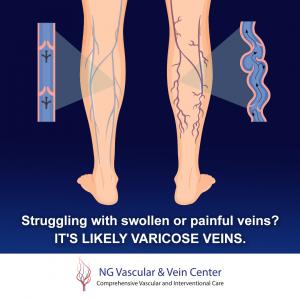Vascular Physician Sheds Light on Varicose Vein Treatments
Dr. Nazar Golewale of NG Vascular compares the latest, minimally invasive approaches to treating varicose veins.
The most important thing to know about varicose veins is they are not just a cosmetic concern. They are usually a symptom of underlying vascular disease that can lead to more serious complications.”
CHICAGO, IL, UNITED STATES, September 23, 2025 /EINPresswire.com/ -- It is now widely accepted that vein “stripping” surgery is no longer necessary to treat varicose veins. However, there are several different minimally invasive approaches to treating this condition and patients are largely unfamiliar with their options, including which treatment may be right for them.— Dr. Nazar Golewale
Dr. Nazar Golewale of NG Vascular & Vein Center has performed more than 4,000 varicose vein treatments on patients throughout Indiana and Illinois. His extensive experience makes him one of the leading experts in the region.
“The most important thing to know about varicose veins is that they are not just a cosmetic concern,” Dr. Golewale states. “They are usually a symptom of underlying vascular disease, and for some people, delaying treatment can lead to more serious complications, including inflammation, blood clots, skin ulcers and deep vein thrombosis.”
Endovascular treatment (performed from outside the body) uses tiny catheters guided by imaging to seal varicose veins. When the vein is sealed, it shrinks and is eventually absorbed by the body. Blood is naturally rerouted through other, healthy veins. Such treatments have been around for more than 25 years and now include many options such as endovenous laser therapy, radiofrequency ablation, ambulatory phlebectomy, sclerotherapy, Varithena (injectable foam) and VenaSeal (medical adhesive).
“There are many, many options available now,” Dr. Golewale continues. “But in my experience, most patients benefit from either radiofrequency ablation, VenaSeal, sclerotherapy or a combination of these.”
Dr. Golewale claims that while EVLT and RFA both use heat to seal off faulty veins, RFA is associated with less bruising and post-procedure pain compared with EVLT and phlebectomy. He prefers VenaSeal to Varithena because he says it requires fewer needle sticks and has a faster recovery. He prefers sclerotherapy for smaller varicose and spider veins. His recommended treatment depends on many factors, including the type, size and location of the varicose veins.
“Ultimately, the decision is up to the patient,” Dr. Golewale adds. “My job is to make sure they have all the information they need to make an informed decision.”
For more information, or to schedule a consultation with Dr. Golewale, please call (219) 208-6218 or (708) 888-1167.
About NG Vascular
NG Vascular & Vein Center offers minimally invasive treatments for various conditions, from peripheral artery disease (PAD), knee osteoarthritis, uterine fibroids and several other conditions. With offices throughout Northwest Indiana & Chicago, the treatments are outpatient based, and patients benefit from greater convenience, a faster recovery and minimal discomfort. For information, please visit www.ngvascular.com.
Ivan Valenzuela
NG Vascular & Vein Center
+1 219-208-6218
email us here
Visit us on social media:
LinkedIn
Instagram
Facebook
YouTube
X
Legal Disclaimer:
EIN Presswire provides this news content "as is" without warranty of any kind. We do not accept any responsibility or liability for the accuracy, content, images, videos, licenses, completeness, legality, or reliability of the information contained in this article. If you have any complaints or copyright issues related to this article, kindly contact the author above.

